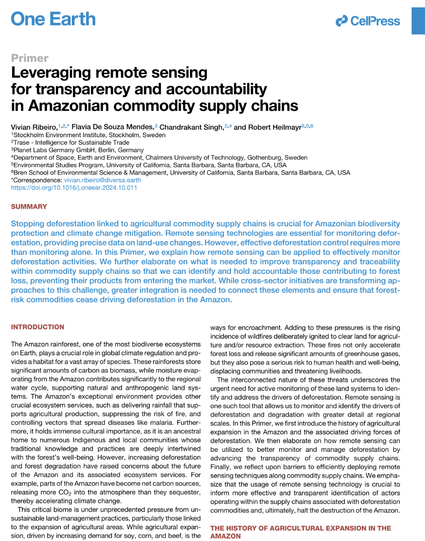https://doi.org/10.1111/1365-2745.14477
https://doi.org/10.1111/1365-2745.14477
#bookchapter #earthworms #forests #climatechange #sustainablelanduse #biodiversity
https://doi.org/10.1007/978-3-031-64510-5_3
🚨 New Paper Alert - Supply Chain/EUDR 🛰 🌳
Thrilled to share the latest research led by the amazing Vivian Ribeiro, "Leveraging Remote Sensing for Transparency and Accountability in Amazonian Commodity Supply Chains." Our study highlights the essential role of #satelliteimagery in monitoring #deforestation, promoting transparency within #supplychains tied to the #Amazon's agricultural #commodities, and addressing key challenges related to #EUDR and others supply chain traceablity frameworks. 🌍 🌳 🛰️.
Stopping deforestation and degradation linked to commodity supply chains is vital to Amazonian #biodiversity and #climate protection. The paper emphasizes that in addition to remote sensing monitoring, supply chain transparency and #traceability are key to preventing deforestation-linked products from reaching the market.
High-resolution imagery provides the detail needed to support accurate #mapping of commodity, helping us distinguish between actual natural forest and tree-crop #commodities like coffee. By combining #multiple datasets, rather than relying on a single source, we improve the accuracy of deforestation and degradation alerts, ensuring they reliably target areas of true concern without mistakenly flagging sustainable land uses. This multi-layered approach is essential for effective, responsible monitoring.
With urgency around #EUDR at an all-time high, it’s crucial that in the trialogue the amendments are rejected. In light of increasing climate impacts and the ongoing #COP29, supporting these amendments would signal a setback in deforestation prevention and erode trust in EU policy-making during a critical climate moment.
This research is a collaboration with colleagues: Vivian Ribeiro, myself, Chandrakant Singh and Robert Heilmayr.
LINK TO ACCESS THE PUBLICATION: https://www.sciencedirect.com/science/article/abs/pii/S2590332224005359?dgcid=coauthor
Grateful for the chance to work alongside such passionate experts and organizations dedicated to sustainable supply chain and forest conservation.
#EarthObservation #SustainableLandUse #RemoteSensing #HighResolutionImagery #SupplyChainTransparency #AmazonConservation #DeforestationFree #EUDR
https://doi.org/10.1016/j.agee.2024.109329
https://doi.org/10.1007/s13593-024-00991-3
Beneficial soil fungi enhance tomato crop productivity and resistance to the leaf-mining pest Tuta absoluta in agronomic conditions - Agronomy for Sustainable Development
Research has shown that soil-borne beneficial microorganisms can enhance plant growth, productivity, and resistance against pests and pathogens and could thus serve as a sustainable alternative to agrochemicals. To date, however, the effect of soil-beneficial microbes under commercial crop production has been little assessed. We here investigated the effect of root inoculation with nine well-characterized bacterial and fungal strains and two consortia on tomato performance under intensive tomato crop management practices. We measured the impact of these root inoculations on plant growth, fruit quality, yield, and pest and pathogen incidence. While most microbial strains showed weak effects, we found that the fungal strains Trichoderma afroharzianum T22 and Funneliformis mosseae significantly increased marketable tomato yield. Moreover, we found that inoculation with most of the fungal strains led to a significant reduction in the incidence of the devastating leaf-mining pest Tuta absoluta, while this effect was not observed for bacterial inoculants. In addition, we found that microbial inoculations did not impact the incidence of introduced natural pest enemies, supporting their compatibility with well-established integrated pest management strategies in horticulture. In summary, the observed general positive effects of soil microbes on tomato yield and resistance reinforce the move toward broader adoption of microbial inoculants in future crop production, ultimately improving agricultural sustainability.
https://doi.org/10.1016/j.tplants.2024.05.010
https://doi.org/10.1016/j.agee.2024.109311
#sustainablelanduse #oxidativestress #polyethylene #soillife #agriculturedepartment
https://doi.org/10.1016/j.heliyon.2024.e37308
https://doi.org/10.1111/gcb.17461
https://doi.org/10.1016/j.ejsobi.2024.103648
Dairy effluent applications to a pasture enhance soil fertility and microbial activity without impacting soil bacterial and fungal community composition
Farm dairy effluents (FDE) from washing the milking parlor contain manure, urine, and chemicals and constitute a large amount of wastewater. Applying …
